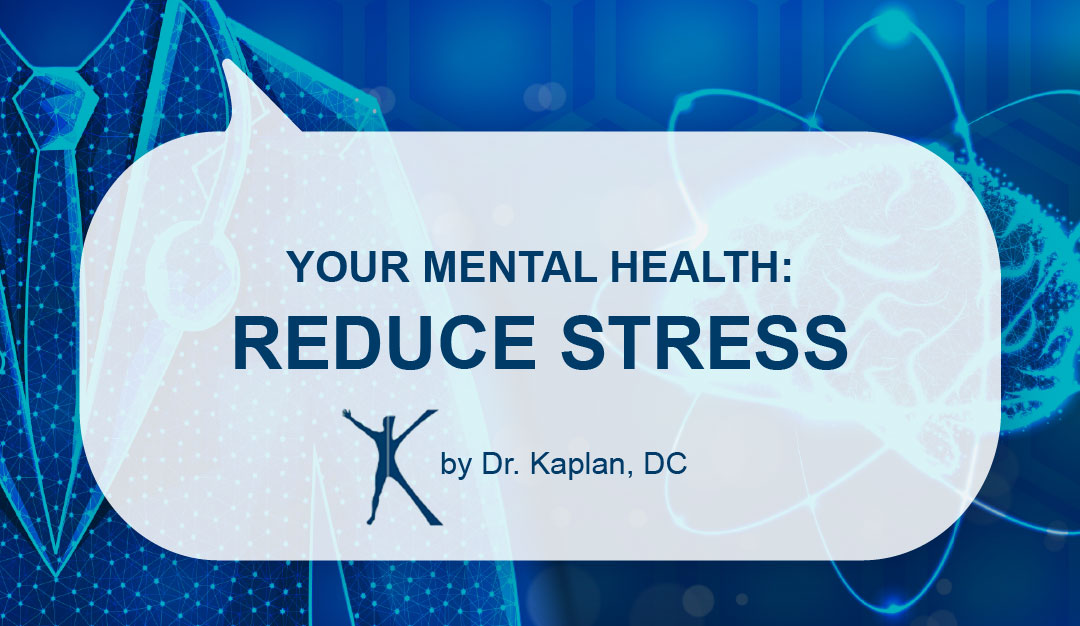Stress is one of the leading causes of abnormal brain health and is therefore nicknamed “the silent killer.” A lot of people do not realize many of their symptoms may be caused by, or aggravated by stress. They may go to a bunch of doctors trying to discover where their symptoms are coming from, but do not get answers. They get bloodwork, X-rays, urinalysis, MRIs, and ultrasounds, only to find out that all the tests are negative. Obviously, it is good that the tests are negative, but it also might be frustrating because they know they do not feel well physically, but there are no abnormal test findings.
 Sometimes it is possible that the environment may be influencing their health more than they realize.
Sometimes it is possible that the environment may be influencing their health more than they realize.
For example, a big environmental influence that has a huge impact on health is the intake of water. Dehydration can cause headaches, menstrual cramps, dry skin, memory problems, digestive issues, and nighttime muscle cramps just to name a few. In addition to lack of sufficient water, lack of sleep can cause many other problems such as anxiety, fatigue, issues with focus or concentration, high blood pressure, low sex drive, obesity, or depression. Another reason people may have an increase in symptoms in addition to lack of sleep or lack of water is lack of food, or if they have not eaten for a long time. This may lead to dizziness, lightheadedness, brain fog, fast heartbeat, visual problems, irritability, lack of coordination, confusion, or sweating. If you are hypoglycemic, be sure you always have a snack on you and do not go more than 2-3 hours without eating something. Moreover, if you have eaten inflammatory foods such as dairy, gluten, corn, soy, coffee, alcohol, sugar, or sugar replacements, you might get joint pain, balance problems, muscles weakness, digestive problems, fatigue, skin problems, hormonal issues, heart problems, dry eyes, and brain issues. However, even though lack of sleep, dehydration, or poor eating habits can cause lots of problems, the most common reason for an increase in symptoms is stress, therefore it is imperative that you avoid all stresses if you would like to function better, feel better, and live better.
There are three main stresses that must be avoided: Physical stress, emotional stress, biochemical stress.
Physical stress would be sitting at the computer all day and typing on the keyboard or scrolling through your phone.
Emotional stress would be if you are unsatisfied at work, have financial issues, are in a bad relationship, or do not like your current living situation.
Biochemical stresses are toxins in our environment like the pesticides in food, the lead in the pipes, the fluoride in toothpaste, or the aluminum in deodorant.
In regards to physical stress, we must get the body moving. If you are sitting at the computer all day, make sure you do what I call the “20 rule”. Every 20 minutes, take 20 seconds to walk 20 feet and look 20 feet away, and then go back to the computer. You can also do 20 seconds of jumping jacks, 20 push-ups, 20 sit-ups, 20 crunches, 20 squats, 20 lunges, 20 burpees, a 20-second sprint, 20 pull-ups, 20 seconds of jump rope, 20 seconds of backward shoulder rolls, or do 20 seconds of shadowboxing. This will help prevent anxiety, depression, back pain, headaches, and may even help with obesity, heart disease, and Alzheimer’s disease.
Another important tip to consider is that you should never cause more physical stress on one side of the body versus the other side of the body. If you are playing golf and are always twisting in one direction, practice swinging the other way so you don’t break down one side quicker than the other side. If you are a garbage man and are always tossing the garbage over your left shoulder, start tossing it over your right shoulder. If you work at the computer, put the monitor on the other side of the desk or start using the mouse with your other hand. Even everyday activities like eating, brushing your teeth, shaving, brushing your hair, writing, carrying your bag, or walking your dog, can all be done using your non-dominant hand. It is very important to make sure you do not do activities that only stress one part of your body to keep things in balance, in alignment, and help to make the right and left brain communicate well with each other.
 Another important aspect of reducing physical stress is going for walks every day; preferably at sunrise and sunset to help set your circadian rhythms which will contribute to better sleep and more energy. Additionally, taking weekly fitness classes or playing sports that are written into your schedule, keeps you active, and also keeps you more social. Use exercise to bond with your spouse, your children, and your friends. Perform these activities outside so you also get oxygen from the trees and Vitamin D from the sunlight. It is recommended that you try exercises that make you strategize like tennis or take a dance class where you have to memorize all of the different steps. Start being the one in the family that takes the dog out for a walk or gets up to help a family member. Moreover, if you remember last week’s article, I wrote that it is helpful if you park your car in the parking spot furthest away from the entrance when you are running errands so you have to walk more and take the steps instead of the elevator or the escalator to increase your daily activity. Always give yourself a reason to move the body more often. If you are at a party and someone wants a glass of water, you can be the person that gets up and goes to the kitchen; therefore you get to move your body more, you did a good deed for someone else, and additionally, that will encourage other people to do good deeds, as well.
Another important aspect of reducing physical stress is going for walks every day; preferably at sunrise and sunset to help set your circadian rhythms which will contribute to better sleep and more energy. Additionally, taking weekly fitness classes or playing sports that are written into your schedule, keeps you active, and also keeps you more social. Use exercise to bond with your spouse, your children, and your friends. Perform these activities outside so you also get oxygen from the trees and Vitamin D from the sunlight. It is recommended that you try exercises that make you strategize like tennis or take a dance class where you have to memorize all of the different steps. Start being the one in the family that takes the dog out for a walk or gets up to help a family member. Moreover, if you remember last week’s article, I wrote that it is helpful if you park your car in the parking spot furthest away from the entrance when you are running errands so you have to walk more and take the steps instead of the elevator or the escalator to increase your daily activity. Always give yourself a reason to move the body more often. If you are at a party and someone wants a glass of water, you can be the person that gets up and goes to the kitchen; therefore you get to move your body more, you did a good deed for someone else, and additionally, that will encourage other people to do good deeds, as well.
Although physical stress is a really big problem, emotional stress is even more significant than physical stress. Sometimes you might have to make major life changes to avoid emotional stress. Families who are dealing with major health issues like cancer or heart disease might need to consider moving out of a big city like NYC and into the suburbs like Bergen County where there is more calmness, nature, animals, and trees. Sometimes you might have to quit a job to reduce emotional stress. There might be a job that pays well, but the hours stink, your boss is mean and you don’t get along with your coworkers. The stress is not worth the money and money are insignificant if you do not have your health. If you want to reduce your emotional stress, sometimes, you might have to get out of a bad relationship. Coming home to a person you do not want to be with can cause so much stress that it might manifest into illness. Some people might not have to break up with a spouse, but they may have to break up with an emotionally toxic family member or friend for their own mental health.
If you want to have less emotional stress, you can also practice mindfulness. For example, when eating a meal, smell the food, feel the texture in your mouth, enjoy each bite, chew your food 30 times, and focus on your swallow. Do not watch television, read the paper, or check social media at the dinner table which will distract you from eating mindfully. Another example is when you work out, try to focus on the muscles you’re working on, feel your breath increasing in lung capacity, feel your heart beating faster, take note of the sweat on your skin, and pay attention to your technique and posture. Do not be talking to your friend on the phone while you are on the machines, or do not be watching the news on the exercise bike because then you would not be practicing mindfulness and you would not be living in the moment.
The third stress is biochemical stress. This includes the chemicals we are exposed to such as deodorant, candles, laundry detergent, foods preserved in bags, plastic containers, cans, or boxes, aerosol sprays, suntan lotions, perfumes, Febreze, Lysol, colognes, Clorox wipes, Glade plug-ins, non-organic fruits and vegetables, bleaches, Teflon pans, many kinds of toothpaste, plastic storage containers, make-up, car air fresheners, cleaning products, plastic water bottles, and most beauty products. These should be removed from your house because they are toxic to the environment, they are toxic to inhale, and they are toxic on your skin, and they are toxic to your brain. Keep in mind that there are healthy alternatives for most of these chemicals, such as baking soda, lemon, vinegar, zinc oxide, coconut oil, tea tree oil, and you can use glass containers, stainless steel cookware, and essential oil diffusers to reduce chemical exposure.
 Another biochemical stress that is important to mention is all the problems with radiation or EMF from electronics such as cell phones, computers, iPads, and microwaves. As all the signals increase in power, they also increase in side effects. Now we have these 5G towers being built all around us, every store or facility has strong WiFi connections, there is Bluetooth everywhere, people’s phones and computers are on 24/7 creating more signals and high EMFs, and let us not forget the smartwatches, smart meters, and smart TVs that bring more radiation to you and your house. It is recommended that you turn your phone on airplane mode when it is near you, turn off your WiFi at night, keep all electronics at least 6 inches from you at all times, and use old school wire headphones instead of Bluetooth earpieces or holding the phone next to your head. Do not place your computer directly on your lap by your reproductive organs. Do not keep your phone on and stored in your front pocket or back pocket, and do not keep it close to your heart either. Sometimes you cannot avoid the radiation, but whatever you can control, keep it to a minimum.
Another biochemical stress that is important to mention is all the problems with radiation or EMF from electronics such as cell phones, computers, iPads, and microwaves. As all the signals increase in power, they also increase in side effects. Now we have these 5G towers being built all around us, every store or facility has strong WiFi connections, there is Bluetooth everywhere, people’s phones and computers are on 24/7 creating more signals and high EMFs, and let us not forget the smartwatches, smart meters, and smart TVs that bring more radiation to you and your house. It is recommended that you turn your phone on airplane mode when it is near you, turn off your WiFi at night, keep all electronics at least 6 inches from you at all times, and use old school wire headphones instead of Bluetooth earpieces or holding the phone next to your head. Do not place your computer directly on your lap by your reproductive organs. Do not keep your phone on and stored in your front pocket or back pocket, and do not keep it close to your heart either. Sometimes you cannot avoid the radiation, but whatever you can control, keep it to a minimum.
In conclusion, it is absolutely necessary to reduce physical, emotional, and biochemical stresses to ensure that the body functions best and feels best. As a result, you will prevent illness and maximize your brain’s potential and prevent memory loss and other neurological disorders. If you have stress in your life, it will make any medical condition you have much worse. It does not matter if you have cancer, heart disease, diabetes, obesity, headaches, dizziness, Parkinson’s, Alzheimer’s, back pain, coronavirus, MS, eczema, psoriasis, or arthritis, if you have high stress, your symptoms will be worse.

